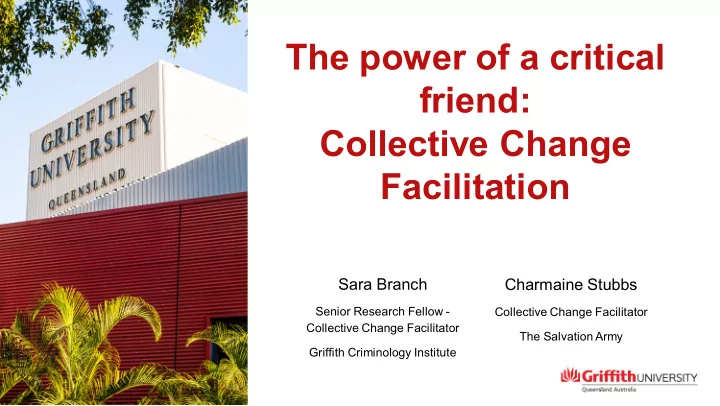

The power of a critical friend: Collective Change Facilitation Sara Branch Charmaine Stubbs Senior Research Fellow - Collective Change Facilitator Collective Change Facilitator The Salvation Army Griffith Criminology Institute
Community Services Shared Purpose and Safe Space for Government Community Respectful Relationships and Co- creation of Really Useful Science-based Tools, Methods and Resources Funders Researchers
https://www.creatingpathways.org.au The Creating Pathways initiative was funded (partially) by the Australian Government through the Australian Research Council in partnership with researchers and partners at the following institutions, Government Departments, and Non-Government Organisations:
Collective Impact Prevention Science Complex, Adaptive Child Problems
The power of a critical friend: Collective Change Facilitation Sara Branch Charmaine Stubbs Senior Research Fellow - Collective Change Facilitator Collective Change Facilitator The Salvation Army Griffith Criminology Institute
Outline • Explain the role of a Collective Change Facilitator • Why the need for a Collective Change Facilitator • Learnings • What next
Collective Change Facilitators The Bridge between systems Adapted from Wandersman et al., 2008
Roles of a Collective Change Facilitator • Helping Hand • Helps build relationships and trust • Critical friend – central role • Help create a safe space • Help guide collaborative reflection of successes and failures • Help capacity building • Technical Adviser • Facilitates the delivery of technical knowledge CCFs need to have a deep understanding of and empathy for the work of community coalitions, while maintaining a level of professional distance that enables them to support, guide and sometimes challenge practice
Collective Impact Facilitator or Collective Change Facilitator Collective - Support people to come together in partnership Change - Change Agent or disruptor of business as usual Facilitator – Definition: make (an action or process) easy or easier
Why the need for a Critical Friend The Who is Varied The How is The What is Unclear Unclear Complexity
Why the need for a Critical Friend The Who is Varied The How is The What is Unclear Unclear Complexity
Why the need for a Critical Friend The Who is Varied The How is The What is Unclear Unclear Complexity
Emergent practice is dependent on… Different perspectives • Collaboration • Strength of relationships Shared Accountability Training Evidence-driven Cycles of Learning
Adaption and Learning is valued • Agile approaches to working are required • Rapid cycles of development, testing with users, and • Adaptation (Thornton, 2019) CREATE Change Engine Cycle
Influencing change is hard and takes time I guess - it's like trying to push a heavy object up a hill, or whatever. It's slow and laborious work . It's constantly reiterating, constantly reinforcing that there's a different way of working that we can get to, but it takes a bit of shifting over time . Despite our organisations being involved in CREATE it doesn’t mean that they're totally on board with shifting, themselves … …I think you're constantly up against the regular way of working , so whether it's just me, or whether it's me and the facilitating partner team, we're constantly feeling the pressure that people just want to - ideally want to keep working the way they already are, because it is easier and so finding different ways of advocating to work differently and finding different ways of communicating that or making it applicable to them is a lot of hard work… That takes time and patience and building up over time , as well . (CIF 6)
Enabling Access Access to the community coalition • lack of access to members of the community coalition can limit the CCF role • Access is enabled through • individual flexibility • organisational flexibility
Enabling Access Internal and Organisational Flexibility CCF role is very dynamic and requires flexibility • Flexibility within the CCF’s mind-set and their actions, and • Flexibility within the people, environment and structures that surround them Flexibility enables CCFs to • Respond to a constantly changing environment • Work in the ‘here and now’
Enabling Time, and Space Time to… Build relationships , trust , understanding and a safe space • time to support relationship building between the CCF and key stakeholders • time for the CCF to develop an understanding of the context and history in which they are working • time to strengthen relationships within the community coalition safe space to enable exploration of successes, failures and innovative solutions
Enabling Time, and Space Time … To be reflective practitioners • time to reflect and discuss with colleagues or a coach what has been happening for them For Community Coalition Reflection • time for the community coalition to reflect on what they are learning – emergent practice • time to strengthen the community coalition’s functioning To continue to develop and share knowledge, skills and resources
Enabling Access, Time, and Space • Shift in organisational structures to enable CCFs the space to engage deeply with others, as well as develop and learn • Shift in those managing or working with the CCF to let go and enable CCFs to explore, build relationships and develop a safe space • Provide CCFs with the flexibility to respond when needed with a focus on the here and now
What’s your learning? Learnt about enabling emergent practice Reflected on COVID-19 What can you change Plan to make TIME for adjustments relationships? you can make
What next? • Development of a Collective Change Facilitation curriculum • Certificate in Community Prevention and Implementation Science • In-house Intensive Training • Collective Change Facilitation Community of Practice • Ongoing work in community to continue to understand and develop the role further
Q&A
Recommend
More recommend